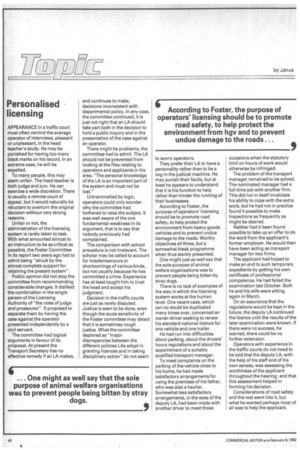Personalised licensing
Page 34

If you've noticed an error in this article please click here to report it so we can fix it.
APPEARANCE in a traffic court must often remind the average operator of interviews, pleasant or unpleasant, in the head teacher's study. He may be punished for having too many black marks on his record. In an extreme case, he will be expelled.
To many people, this may seem unfair. The head teacher is both judge and jury. He can exercise a wide discretion. There is usually a remote court of appeal, but it would naturally be reluctant to overturn the original decision without very strong reasons.
Unfair or not, the administration of the licensing system is rarely taken to task. With what amounted almost to an instruction to be as critical as possible, the Foster Committee in its report two years ago had to admit being "struck by the almost complete support for retaining the present system". Public opinion did not stop the committee from recommending considerable changes. It disliked the combination in the single person of the Licensing Authority of "the roles of judge and prosecutor". It proposed to separate them by having the case against the operator presented independently by a civil servant.
The committee had logical arguments in favour of its proposal. At present the Transport Secretary has no effective remedy if an LA makes, and continues to make, decisions inconsistent with departmental policy. In any case, the committee continued, it is just not right that an LA should take part both in the decision to hold a public inquiry and in the presentation of the case against an operator.
There might be problems, the committee had to admit. The LA should not be prevented from looking at the files relating to operators and applicants in his area. "The personal knowledge of the LA is an important part of the system and must not be lost."
Untrammelled by logic, operators could only wonder why the committee had bothered to raise the subject. It was well aware of the one fundamental weakness in its argument, that is to say that nobody previously had complained.
The comparison with school procedure is not irrelevant. The scholar may be called to account for misdemeanours or shortcomings of various kinds, but not usually because he has committed a crime. Experience has at least taught him to trust the head and accept his judgment Decision in the traffic courts are just as rarely disputed. Justice is seen to be done, even though the acute sensitivity of the Foster committee may detect that it is sometimes rough justice. What the committee deplored as "major discrepancies between the different policies LAs adopt in granting licences and in taking disciplinary action" do not seem to worry operators.
They prefer their LA to have a personality rather than to be a cog in the judicial machine. He may punish their faults, but at least he appears to understand that it is his function to help rather than hinder the running of their businesses.
According to Foster, the purpose of operators' licensing should be to promote road safety, to help protect the environment from heavy goods vehicles and to prevent undue damage to the roads. Worthy objectives all three, but a somewhat bleak programme when thus starkly presented.
One might just as well say that the sole purpose of animal wefare organisations was to prevent people being bitten by stray dogs.
There is no lack of examples of the way in which the licensing system works at the human level. One recent case, which can no doubt be duplicated many times over, concerned an owner-driver seeking to renew his standard national licence for one vehicle and one trailer.
He had run into difficulties about parking, about the drivers' hours regulations and about the appointment of a suitably qualified transport manager.
To meet complaints on the parking of the vehicle close to his home, he had made satisfactory arrangements for using the premises of his father, who was also a haulier. Somewhat less satisfactory arrangements, in the eyes of the deputy LA, had been made with another driver to meet those occasions when the statutory limit on hours of work would otherwise be infringed.
The problem of the transport manager remained to be solved. The nominated manager had a full-time job with another firm. This did not in itself invalidate his ability to cope with the extra work, but he had not in practice found it possible to make inspections as frequently as might be desired.
Neither had it been found possible to take up an offer to do the work from the applicant's former employer. He would then have been acting as transport manager for two firms.
The applicant had hoped to make an end to such temporary expedients by getting his own certificate of professional competence. He had failed the examination last October. Both he and his wife were sitting again in March.
On an assurance that the regulations would be kept in the future, the deputy LA continued the licence until the results of the later examination were known. If there were no success, he warned, there could be no further extension.
Operators with experience in the traffic courts do not need to be told that the deputy LA, with the help of his staff and of his own senses, was assessing the worthiness of the applicant throughout the hearing; and that this assessment helped in forming his decision.
Considerations of road safety and the rest went into it, but what he wanted perhaps most of all was to help the applicant.


































































